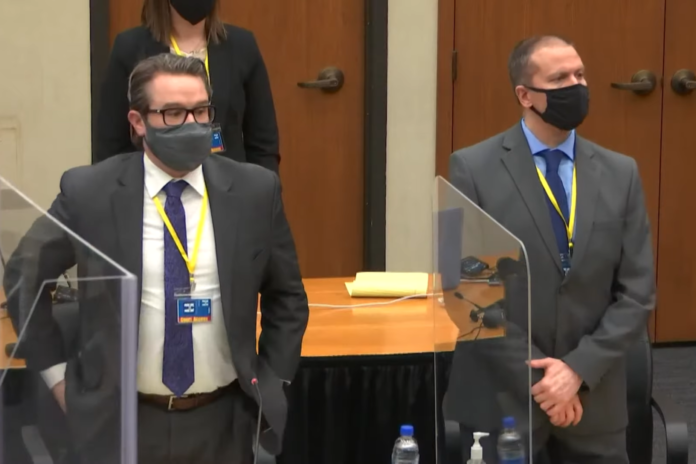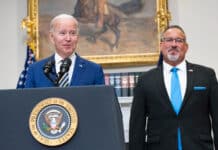
(Power Line) — KTLK’s Jon Justice and Drew Lee have deputized me to act as their Chauvin case correspondent with regular appearances at the top of the show’s third hour at 8:00 a.m. (Central). We had a lot to talk about yesterday, including my preview of Judge Cahill’s rulings at 8:15. I thought some readers might find it of interest.
During the segment I took up this AP story conveying an allegation of racism in the striking of juror 76. I find fault with the AP story for omitting Judge Cahill’s express finding that the striking of the juror by the defense was made in good faith for a legitimate nondiscriminatory reason. (The AP reporter whom I referred to in my comments is not one of the story’s two authors.)
Judge Cahill took the bench promptly at 8:15 as promised to announce his rulings on pending motions. Consistent with my previews on Justice & Drew and in my daily updates here, he denied Chauvin’s motions for change of venue and continuance. He shut down the prosecution’s effort to introduce expert testimony from Dr. Vincent on George Floyd’s state of mind during his arrest on May 25, 2020 and granted Chauvin’s motion to admit some of the evidence deriving from Floyd’s arrest in May 2019. The video below includes Judge Cahill’s announcement of his rulings followed by comments from KARE 11’s Lou Raguse.
In his denial of the change of venue motion, Judge Cahill conceded his surprise at the effect of the city’s $27 million settlement of the wrongful death lawsuit brought in federal court on behalf of Floyd’s family. Via Zoom Judge Cahill himself examined each of the seven jurors seated before announcement of the settlement by city officials at the end of last week. Based on his voir dire regarding their awareness of the settlement and its impact on them, Judge Cahill dismissed two of the seven previously seated jurors for cause.
He took this as illustrative of the problem of publicity that permeates the case and threatens Chauvin’s right to a fair trial, but deems the problem irremediable by change of venue. He counts on the process of voir dire to filter out jurors who have been unduly affected by the publicity and on the jurors’ avoidance of news on the case during their service to protect Chauvin’s fair trial right.
The law on venue addresses pretrial publicity. Late Thursday afternoon defense counsel Eric Nelson filed a memorandum of law along with three related exhibits (here, here, and here) supporting his new trial/change of venue motion. They go into some detail on the pervasive pretrial publicity in the Twin Cities.
Pretrial publicity obviously raises a serious fair trial problem. It may render a fair trial impossible. It has nevertheless been dealt with in voir dire and is a problem that is usually within the capacity of the judicial system to cope. Moreover, it raises the question of an alternative venue within Minnesota that is not susceptible of an obvious answer.
The deepest fair trial problem in this case, however, may be manifest in the closure of the courthouse and the martial security that now protects it. Voir dire has explored this problem to a limited extent as well, but I wonder if the judicial system is capable of dealing with it. I doubt it.
Following a break juror number 96 was called for voir dire. She learned of the settlement of the wrongful death lawsuit via a scrolling headline on television but said it had no impact on her. She described herself as a lover of dogs with a passion for the homeless and the issue of affordable housing. She takes nature walks to relax. She finds the court’s security arrangements reassuring.
She has seen clips of the video on the news two or three times. In her juror questionnaire she imputed the cause of Floyd’s death to his restraint by the police, but said she could set her opinions aside in this case. She described her opinion of Chauvin as “somewhat negative.” At this point in my notes I wrote that I would want to strike her but she’s going to be the thirteenth juror, and that’s what she is.
She expressed sadness that a person lost his life over a $20 bill, but freely conceded that she didn’t know “what happened prior.” She thought “maybe there could have been a different outcome.”
She strongly agrees with the proposition that the police make her feel safe and strongly trusts the police. “We need law enforcement,” she said, citing the damage her place of employment sustained during the riots following following Floyd’s death and its subsequent closure for a week. This case has touched an incredible number of us. Fearing riots and destruction all over again, to my point above, she expressed nervousness about the consequences of the verdict in this case.
She feels the magnitude of the responsibility to take in the evidence and render a verdict in this case. She expressed the view that there are “strong opinions on both sides.” Despite my doubts about her above, taking all her remarks together, I thought she sounded perceptive and fair. Nelson passed her for cause. After further voir dire that added a bit more of interest — she doesn’t buy the racial critique of the police and the justice system — Steven Schleicher passed her for cause on behalf of the prosecution. When she was seated as the thirteenth juror in the case, the court advised us she is a white woman in her 50s.
The rest of the day was devoted to voir dire of jurors 99, 103, 109, 110, 111, and 113. We came away empty-handed. All but jurors 109 and 111 were excused for cause.
Juror 109 was subject to a peremptory strike by the prosecution and number 111 by the defense. Juror 111 is a St. John’s college student who works in a bar in St. Joseph, Minnesota. He is an intelligent all-American young man who is woke to the nth degree. He added to my doubts about the future of the United States. I thought the defense had to strike him and Nelson did.
Juror 113 sounded like another young man. He was carjacked in St. Paul on February 11 “next to Macalester College,” a beautiful neighborhood I have reason to visit every week. He expressed reservations about his ability to credit police testimony equally with that of other witnesses. Examined by Schleicher on this point, he could only get 95 percent of the way there. He was excused for cause on Nelson’s motion.
Judge Cahill announced that jurors 101, 106, and 107 have been excused by agreement of the parties while juror 102 was excused as no longer qualifying for jury service in the case.
At the end of the day Judge Cahill caused some confusion among the reporters including me when he stated that they would be looking to add two more jurors next week to the 13 now seated. Judge Cahill had initially given the number as 16, then as 14. Following our expression of confusion the court advised us that “in accordance with its November 4, 2020, order, the Court will [seat] up to 16 jurors for the trial in the case State of Minnesota v Derek Chauvin.”
















